Breaking Brian Shin: portrait of a Bay Street master and suburban drug dealer
Brian Shin was a Bay Street financial whiz with a secret life as a high-volume drug dealer. When he slipped up, he lifted the veil on a powerful criminal underground run by second-generation Asian kids
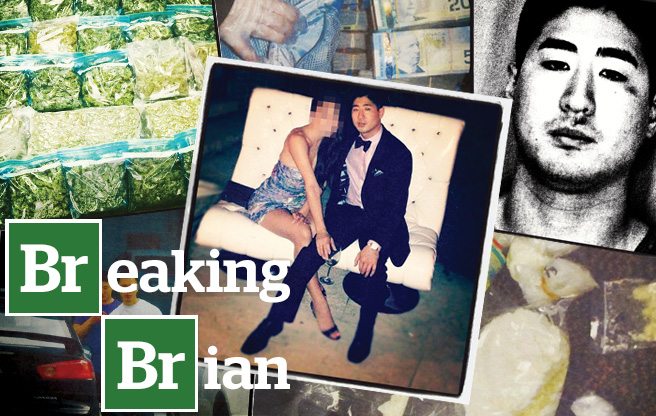
Brian Shin seemed like the ideal employee. He worked long hours, dressed sharply and exuded sufficient swagger to fit in on Bay Street. His pedigree—a bachelor’s in commerce from U of T, a master’s in taxation from the University of Waterloo and work experience at the tax firm Deloitte—made him overqualified for his job at Lannick, a corporate recruiting firm. In two years, he placed roughly 100 managers and executives, and contributed $700,000 to the bottom line, making him one of the company’s top recruiters. He earned a salary of $130,900.
Shin was handsome, his hair neat and cropped short on the sides, and he was persistent and passionate in his work. He had a soft touch, too. When the mother of one of his former clients was diagnosed with terminal cancer, Shin made a point of offering his condolences. His boss, Joseph Diubaldo, considered Shin the best employee he’d ever hired.
In January 2012, Shin invited Diubaldo out for coffee, something they’d done regularly. But this time was different: Shin seemed agitated, and Diubaldo guessed that something was wrong. Then, Shin dropped a bombshell. For nearly half his life, he told Diubaldo, he had trafficked marijuana. He’d started in Grade 9 and worked his way up the food chain for 14 years—keeping his double life secret from his family all the while—and at his peak dealt upwards of 500 pounds of weed a year and handled $1.8 million in cash. He recounted how, in the summer of 2009, he’d been arrested at his stash house, how his parents, heartbroken at the news, had bailed him out, and how he was now awaiting trial. Working as a headhunter, he said, was a way to cover his legal bills, but the guilt of lying was gnawing at him. He was desperate to confess before Diubaldo read about him in the news.
Shin came from a loving, supportive, hard-working family. He had a top-tier education and ample opportunities at a legitimate career. On the surface, his descent into the criminal underworld seemed unlikely, but it fit an emerging pattern. According to police, in multicultural Toronto, certain types of criminal activity are often tied to ethnicity: South Americans dominate cocaine production, while Italians handle the distribution and Mexicans the street-level trafficking; Chinese rule the meth trade, thanks to ties to mainland China where raw chemicals originate; Middle Eastern immigrants largely control the heroin market; and West Africans are the masters of identity fraud. The production and distribution of marijuana is an Asian specialty, due mostly to cultural connections to Canada’s West Coast, the mecca of pot, where the vaunted B.C. Bud is grown. The hyperpotent strain, which was developed in the 1980s by Vietnamese farmers on northern Vancouver Island, gives those who have access to it an enormous advantage in the market.
In the 1980s, Asian criminals in Canada were known for more than just marijuana trafficking. Toronto-based offshoots of China’s powerful 14K and Sun-Yee On triads sold heroin and cocaine, and unleashed a wave of crime—extortion, kidnappings, carjackings—in Chinatown and across the city.
The bloodshed peaked in 1991, when 16 of the city’s 89 homicides were linked directly to drug wars between rival Asian gangs, including the assassination of Vietnamese-Chinese crime boss Asau “Johnny” Tran, who was gunned down outside a restaurant on Dundas West.
The Toronto Police Service’s Asian Organized Crime Task Force, which included more than a dozen officers who knew the languages, cultures and histories, and were equipped to do undercover work, as well as gain the trust of the law-abiding Asian community, kicked into high gear. In 1993, the task force executed Project Sea and Sky, a raid on credit card counterfeiting operations run by the triads, and in 1994 Project Luen Hop, a massive heroin bust at Broadview and Gerrard, and in Markham. Eventually, the major triad members were arrested, deported and largely wiped out.
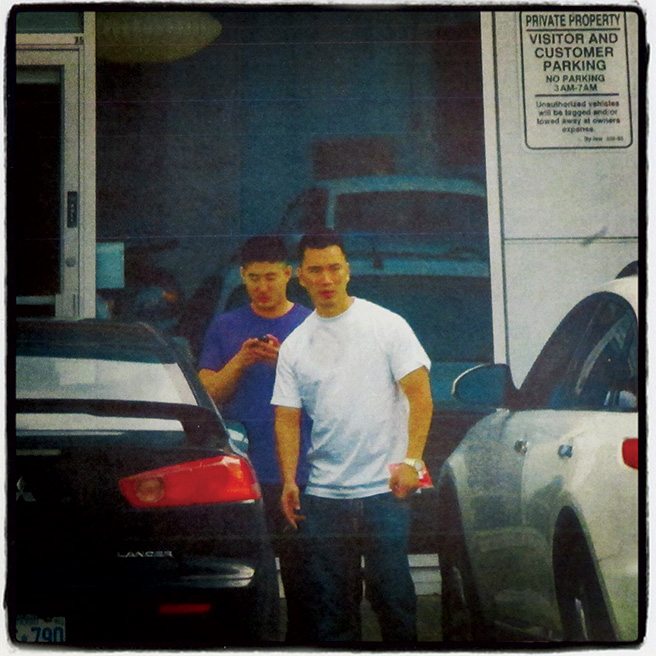
In 2009, police began to follow Shin (above left) and another drug dealer named Khanh Mac
In the following years, independent marijuana grow ops proliferated. These cells were often located in residential basements or the back rooms of small businesses, and the perpetrators rejected gang names or formal hierarchy in order to avoid being prosecuted for organized crime. In September 2011, the task force executed Project Chun Tsao—Chinese for “Spring Weed”—a $15-million bust of grow ops in Pelham, Waterford and Pickering. Police ultimately seized 20,500 plants and arrested 11 men of Asian descent from the GTA. A year later, the task force was part of a national operation that seized more than $2 million in marijuana, property and cash from 10 people, including two father-and-son teams, who operated a trafficking operation between Ontario and B.C.
Despite the repeated busts, the widespread demand for weed—every year, tens of thousands of kilos of marijuana are trafficked around Ontario—creates employment opportunities, and new Asian immigrants, who often face grim job prospects, are easy targets. So too are their offspring, whose fluency in English makes them invaluable to the trade.
Brian Shin made a perfect candidate.
Kun-Sun Shin and Sang-Chu shin came to Canada from South Korea in the late 1970s. They saved enough to buy a convenience store in a strip mall on Kingston Road near Midland and live in a small bungalow nearby. On weekends, their two boys, Dale and Brian (who is three years younger), worked in the store for a small allowance. Shin’s mother, who goes by the name Julie, was strict and intensely religious. She took her kids to a Korean Catholic church on Sundays while Kun-Sun worked behind the counter. Both parents drilled into their boys the importance of education as a way to get ahead in life.
Brian worshipped his older brother and regarded him as a genius. Academics came easily to Dale, and his effortless intellectual prowess made Brian feel inadequate and insecure. In Grade 6, Dale won his school’s top academic award. Three years later, Brian failed to repeat the feat and was devastated.
As Shin’s self-esteem plummeted, he met an older boy at his church’s youth group, whom he immediately idolized: this boy was arrogant, irreverent and popular with the girls. Near the end of Grade 9, he handed Shin an ounce of weed stuffed inside a sunglasses case and told him to sell it at his school. Shin wanted nothing more than his new friend’s approval, and he finally had a chance to earn it. When he returned with a pocketful of cash and an empty case, the older boy gave him more. By the end of the year, Shin was selling an ounce a week. He started acting up at his school, the prestigious arts academy Wexford Collegiate, getting into fist fights and arguing with his teachers, and was eventually asked to leave. He smoked weed every day and drank heavily, occasionally to the point of blacking out, and his extra pocket cash allowed him to afford envy-inducing possessions. At his new school, R. H. King, he became known as the school pot dealer—and someone not to mess with. In his mind at the time, his new identity was a significant upgrade from lesser son of immigrant convenience store owners.
Opportunities soon arrived for Shin to become more deeply enmeshed in the drug world. While the Mexican cocaine trade is a competitive and bloody business, the Asian weed trade is much more co-operative. The industry is organized in a sprawling web of producers and dealers. In the middle of the web are brokers who match supply with demand, much like stockbrokers. If a broker can’t locate enough supply, he might call a rival broker to help out. A police officer I spoke to likened this collaborative ethos to the way Korean convenience store owners band together to buy products in bulk, sharing the savings.
Shin moved quickly from street dealer to high-level distributor and was well on his way to becoming a broker. Despite his various infractions at school, he was sufficiently studious—he kept a B-plus average—to avoid suspicion. He dealt throughout high school and university, sometimes hiding his stash in the trunk of his car in the family driveway. His B.C. Bud arrived from one supplier in vacuum-sealed bags to mask the smell in transit. His Ontario weed arrived loose, and he’d package it himself, dividing it into five- and 10-pound blocks, then driving it around the GTA, making exchanges with various lower-level distributors, who’d then sell to street dealers. By the end of grad school, he was selling an average of 40 pounds a month, which he stored in deep freezers in stash houses, and raking in $30,000 a month in cash.
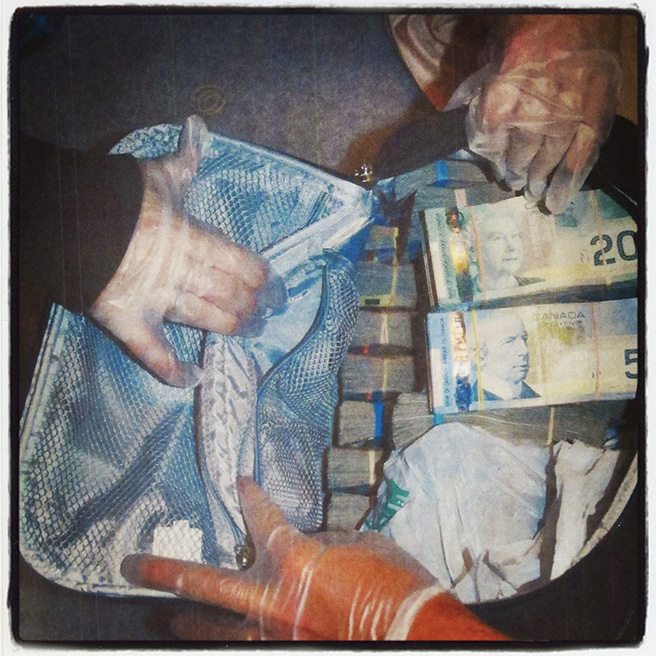
Project Isis yielded $3 million in drugs, 11 luxury cars and two handguns. During the raid, Shin was tackled to the ground by police
Shin was meticulous. He worked alone, so that he wouldn’t fall victim to others’ mistakes. To his fellow traffickers, he went by the nickname Sebastian. His driver’s licence address came back to a UPS mailbox. He kept two phones on him at all times—a BlackBerry that he used to communicate with his family, and a cheapie for business, which he registered under names like Adam West and Andrew Green, and would replace every month.
Police suspect that Shin was also using black-market software that sends calls overseas and back, which obscures the source and makes them difficult to tap and trace. When he picked up a new supply, he’d stuff it in a hockey bag and clutch a hockey stick so it appeared he was simply coming home from practice, not lugging around a small fortune in weed.
He began to hang out with a convicted drug dealer named Khanh Mac, who wore a diamond in his left ear, and one of Mac’s clients, a “sub-dealer” named Jimmy Ngo. Ngo was younger than Shin but looked much more mature, earning him the nickname Old Man. The three men hung out at bars, clubs and strip clubs, enjoying the good life.
Mac’s supplier was Clinton Yow Foo, who had a rap sheet for trafficking, firearms and assault, and whom the police referred to as Mr. Big, because he was further up the group hierarchy and a conspicuous spender. In March 2009, he paid $48,000 in cash for an Audemars Piguet watch for his girlfriend, and he shopped regularly in Yorkville with Mac and Ngo. Shin knew Yow Foo but kept his distance: he thought Yow Foo, who kept two loaded handguns in the upstairs closet of his stash house, was “a bit off.”
While Shin’s family saw him coming and going at odd hours, and showing up with expensive new clothes, gadgets and cars, they never asked him directly about it. In a letter to Shin’s trial judge, Dale wrote that none of them had even “an inkling” of his crimes. “Nor,” he added, “could we comprehend how or why someone with his background, education and other considerable advantages would have engaged in such activities.”
When he wasn’t ferrying weed around the city or clubbing with friends, Shin studied. At U of T and Waterloo, he paid his tuition on his own, in full. When he graduated with his master’s degree, the tax giant Deloitte and Touche (now just Deloitte) hired him as a consultant with a starting salary of $60,000. His area of focus was tax compliance, planning and research support to privately owned corporations in the GTA. He bought a four-bedroom red-brick home on a corner lot in Markham with a wraparound porch and two-car garage.
Before starting his job, Shin took a long vacation with his new girlfriend, Lydia Nam, who worked as an insurance agent. Nam was glamorous, with the slim, fit figure of a gymnast, straight black hair and long eyelashes. She wore stylish clothes and aspired to work in fashion. Nam and Shin daydreamed about starting their own clothing line, an idea that Shin found enticing because he dreaded the long hours, dull work and minimal respect of his tax job. He was also reluctant to give up his drug business—it would mean a drastic pay cut. So in the summer of 2006, after just two months at Deloitte, he quit. Nam and Shin incorporated their fashion company, Dealers of the Purple Cloth, the following winter. The name was a nod to the biblical story of Lydia of Thyatira, a vendor of purple fabric. (Purple, produced by painstakingly milking dye from a certain species of predatory sea snail, was scarce and therefore considered luxurious.) Shin was the company’s chief executive, Nam its creative director.
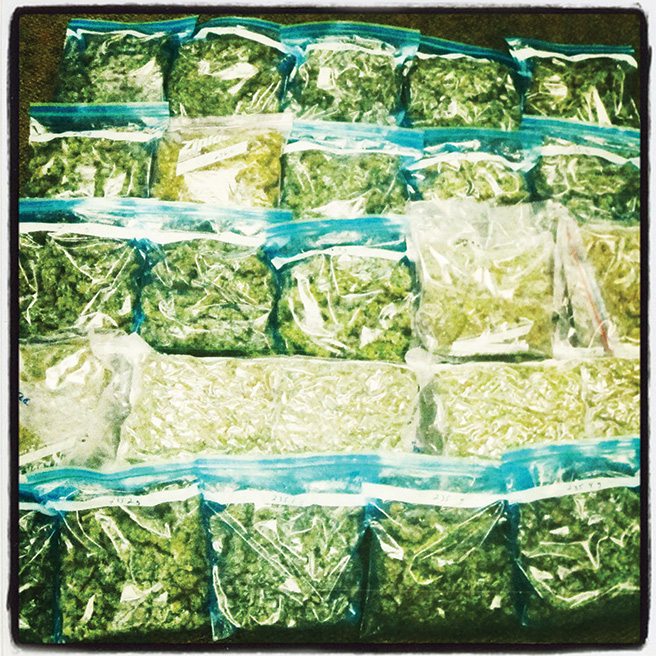
Project Isis yielded $3 million in drugs, 11 luxury cars and two handguns. During the raid, Shin was tackled to the ground by police
The womenswear line had a crown for a logo and featured neon T-shirts, hoodies, pants and dresses with giant cartoon faces and cheeky quotations in large fonts. (One read “I Love Dope Boys.”) Nam produced a lookbook for retailers while Shin rented an office and a storage unit. They held shows during Toronto Fashion Week. At one point, Nam met Daymond John, founder of FUBU and a star of the TV show Shark Tank, who captioned an Instagram photo of them together, “Hanging with the ultimate girl of style in Toronto.”
The clothing company was the perfect front. Shin most likely used the business to launder his drug money. But for all the glamour of being an apparently wealthy clothing brand owner, the double life began to wear on Shin. He was sleeping erratically, and he wanted to go clean. He worried constantly that his associates might rat him out or rob him, and grew paranoid that the police were lurking around every corner.
They were, as it turned out. Project Isis began as a drug buy from a 33-year-old Whitby street dealer named Michael Patrick. In the spring of 2009, he offered undercover police any amount of cocaine they wanted, and said it with enough confidence that they knew he was telling the truth. Police tapped his phone and tailed him to a meeting with one of his suppliers, Jimmy “Old Man” Ngo.
A few days later, Ngo left his home to meet Shin and Mac at a restaurant in Markham. En route, Ngo committed a minor traffic violation, giving his police tail exactly what they were waiting for: a reason to pull him over. Ngo gave a fake name, but police knew he was lying and booked him.
Ngo’s girlfriend, Lisa Nguyen, had pulled up in a separate car behind Ngo during the stop, and after the cops took Ngo to the police station, they tailed her. She drove to the Markham house she shared with Ngo, went inside and emerged with a black bag, then drove to meet Mac in the restaurant parking lot. Mac placed the bag in the trunk of his white Infiniti SUV and then went back inside. Once they’d eaten, Shin and Mac exited, got into their cars and drove off. Durham police, sitting in the parking lot with a long-range lens, captured it all.
Police tailed Mac to a high-rise at 9017 Leslie Street, where they watched as he took the bag up to the lower penthouse level, then left 10 minutes later. Through interviews with building staff, police began to suspect that Shin and Mac shared the stash house, though neither seemed to live on the premises. Mac had been storing his cocaine, heroin, meth and other drugs, plus stacks of bills, in the same bedroom in which Shin kept his weed and cash.
The surveillance operation wasn’t flawless. On the night of July 8, two plainclothes officers entered the underground parking garage at Mac’s condo—the Tip Top Tailors building on Lake Shore West. They slid underneath Mac’s Infiniti to plant a tracking device, then froze: Mac was approaching the car. The officers leapt up, mumbled something about having lost their keys, jumped in their car and sped off.
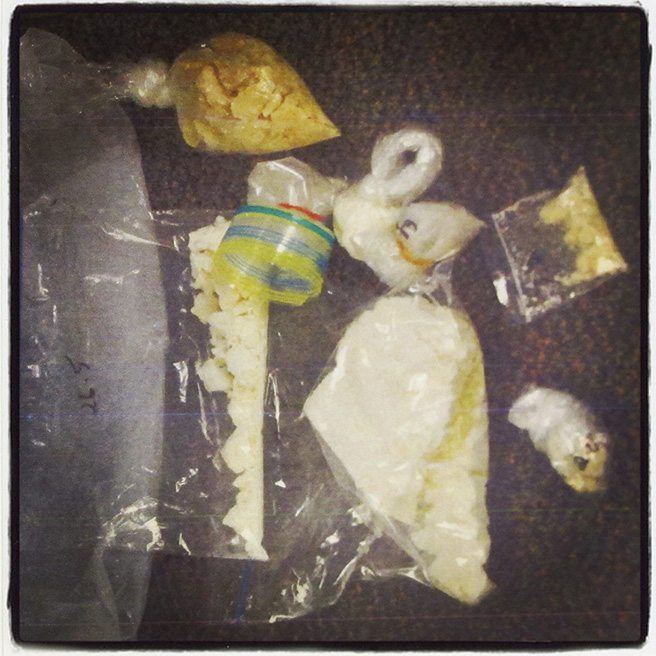
Project Isis yielded $3 million in drugs, 11 luxury cars and two handguns. During the raid, Shin was tackled to the ground by police
Mac panicked and called Shin. He guessed it was the cops—“Who else would be under your car?” he said. Shin told Mac he was “on fire” and to lie low for a while. Two weeks later, Mac, Ngo and Yow Foo went to the Niagara Fallsview Casino, pulling bills from a bag of cash to play blackjack. Police watched as they gambled away as much as $20,000.
By August 6, the Durham Police’s Drug Enforcement Unit, led by Detectives Craig Hudson and Cyril Gillis, received authorization to execute search warrants on the stash house. At first glance, the place looked lived in: there was a couch, a TV, a bin of clothes and a copy of Vibe magazine on the coffee table. But they noticed that the fridge contained only cream cheese and a bottle of water, and that the TV had no cable service. In a locked bedroom they hit the jackpot: three kilos of cocaine, 81 grams of crack cocaine, seven kilos of weed and $235,335 in cash.
The team bagged and removed the money and drugs, and was essentially finished with the penthouse. But Hudson wanted what police call the “most compelling evidence of agency”—an irrefutable link between the suspect and the crime. In this case, that meant Shin or Mac putting a key in the door. Minutes later, Detective Hudson received word from his surveillance team that Shin was headed back to the unit.
Three cops stationed themselves near the door, the word POLICE on their bulletproof vests gleaming in the dark. The go-to tactic in such a situation is called “surprise and superiority.” The idea is to outnumber the suspect and overload the senses with loud noises and flashing lights. The three or four seconds it takes the suspect to react is the ideal time to strike. At 8:58 p.m., word came over the radio that Shin was on his way up.
When Shin stepped inside, the lights were off, as usual, but something was wrong: the mirrored sliding door of the hall closet, which he always left closed, was open. The lights flicked on, and three police officers rushed at him, guns drawn, screaming at him to get down. Shin tried to comply, but was paralyzed with fear. His keys dropped to the floor, and he stumbled backward. One officer tackled him and cuffed his hands behind his back. While the cops read him his rights, Shin could muster only a soft “fuck, fuck, fuck” over and over again.
In Shin’s car, police found another $5,200 in cash and two large bags of marijuana with a street value of up to $96,000. Later that night, police arrested Mac and Ngo. In Ngo’s vehicle, they discovered a custom speaker system with a hydraulically operated cover that concealed $250,000 in cash. In Mac’s condo, they found cocaine wrappers, cash and drug debt lists.
On August 9, police arrested the largest fish of all, Clinton “Mr. Big” Yow Foo. Inside his stash house, a vacant, newly built townhouse off Royal York Road, police found two loaded handguns, 252 rounds plus three magazines of ammunition, a ski mask and gloves, 238 grams of crack cocaine, 117 grams of powder cocaine, 673 grams of heroin and 8.7 grams of crystal meth (the estimated street value of the narcotics was close to $2 million). In his car, they retrieved $25,000 in cash and six BlackBerrys.
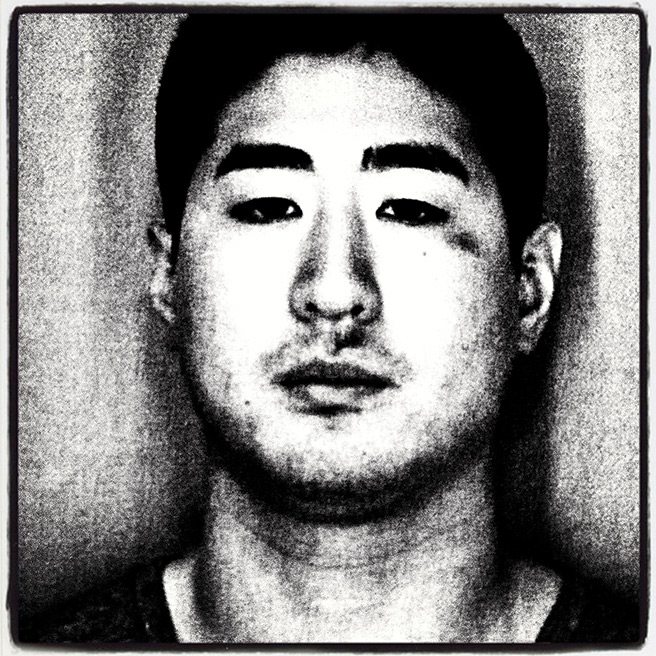
Brian Shin
All told, Project Isis, a three-month investigation that began with a street buy in Whitby, netted 12 suspects and saw the seizure of $3 million in drugs, 11 cars, three residences and countless luxury goods, and disrupted a major network in the GTA’s drug market.
The Shins managed to scrounge up $275,000 for Brian’s bail. As a condition of his release, he had to live with his parents. He swore he’d never lie to them again. He laid bare everything: his long-standing inferiority complex, the shocking extent of his deception, the state of his finances, the crushing burden of living a lie for so long.
Shin accepted responsibility for the weed and money, but he wouldn’t claim ownership of the harder drugs, even though it might have saved him considerable legal fees. From his small room in his parents’ basement, Shin launched his reclamation project. He hired a lawyer and started to look for a job. Six months later, relying on his accounting credentials (and neglecting to disclose the full scope of his post-Deloitte activities), Shin was hired at Lannick.
His coffee date with Diubaldo was torturous, but ultimately a success. Diubaldo decided he was too valuable to lose.
The night before his trial, Shin didn’t sleep. He was nervous and shaking on the stand, but calmed down as he laid out the details of his marijuana dealing. He did not, he maintained, deal harder drugs. In fact, he claimed he’d never even seen hard drugs in the stash house before.
The prosecutor responded with two compelling questions: Why would Shin share a stash house with a convicted cocaine dealer? And wasn’t it too convenient that, for months, Mac stored only money at the stash house, then decided to store drugs there just hours before the police raid?
The crown failed to convince the jury, who found Shin not guilty of heroin and cocaine possession, but guilty of possession of marijuana and the proceeds of crime. The crown prosecutor asked for a four-year sentence. Justice John McIsaac trumped the crown, sentencing Shin to six years plus a $575,000 fine. He reasoned that Shin had many opportunities to quit dealing drugs, and strongly suggested he had exploited his tax expertise and used his clothing business to hide his profits from investigators and the CRA. He offered Shin the chance to seek a financial hardship exemption, but doing so would have exposed any funds Shin had hidden away. Shin declined. The sentencing made the news—“Tax whiz kid by day, mega-trafficker by night” read the headline in the National Post—and Diubaldo had no choice but to let Shin go.
Shin replaced his lawyer and filed for an appeal, which will be heard in early 2014. If he loses, he’ll serve three years before he’s eligible for parole. His new lawyer is contending that the terms of the police’s general warrant had expired as soon as they removed the evidence from the stash house. By waiting in secret for Shin to return, they’d violated the warrant, and his arrest was therefore invalid. The argument seems bound to fail, since the police had already collected the drugs and established Shin’s connection to the stash house. What seems more likely on appeal is a reduced sentence.
After the arrest, police searched the storage locker belonging to Dealers of the Purple Cloth but found only clothing. They spoke with Nam, but laid no charges. Once Shin’s appeal wraps, it’s likely the CRA will investigate the financial history of Dealers of the Purple Cloth. (After the bust, Nam married the American rap artist and producer The-Dream, with whom she’s since had a child.)
Almost all of the other accused in Project Isis pleaded guilty. Michael Patrick, the street dealer who sparked the investigation, received a conditional sentence of five months and a 10-year weapons prohibition. Ngo was sentenced to 910 days and given a 10-year weapons ban. Mac was sentenced to six years and given a lifetime weapons ban. Yow Foo was sentenced to 12 years in prison and a lifetime weapons ban, and has filed for appeal.*
I met Shin in January 2013, at The Gabardine, a popular after-work restaurant on Bay Street. He was still out on bail, waiting for his appeal to be scheduled. He wore a long black coat with a brocaded shawl collar and kept his expensive cell phone on the table between us. He clearly wasn’t suffering for cash, but his face was drawn and pale, and he rarely smiled. We met to discuss the scope of the story and whether he’d agree to participate. I sensed that he was eager to tell his story—that there was an element of pride at having been so good at something for so long—but that he’d done too much harm to his family to risk putting them in the spotlight again. He declined.
Last November, I drove out to Shin’s parents’ convenience store. Inside, Kun-Sun Shin stood behind the counter, next to covered rows of cigarettes and discounted two-litre bottles of ginger ale. His grey hair had been poorly dyed a shade of dark orange, and he wore a vest over a thin purple dress shirt. His hands were gnarled and bony, the chapped tips wrapped in Scotch tape. He looked about 70, clearly past retirement age, but thanks to the bail he’d posted for his son, was still toiling. His eyes were kind, like Brian’s, but sad and tired, too. I had entered with the intention of discussing his son, but instead stood there, awkwardly, for a few seconds, and then, grasping for something to say, asked if he carried sunflower seeds. He seemed perplexed, and pointed to the display of chips. Clearly, he didn’t speak much English. It made sense: he had eked out a living one packet of gum at a time, a job that requires no proficiency in English, all in the hope that his kids would have a better life. He’d been through enough. I grabbed the closest thing I could find, paid, and left.
* UPDATE: On December 12, 2013, after the January edition of Toronto Life was printed, the Ontario Court of Appeal allowed Clinton Yow Foo’s appeal and directed acquittals on all charges related to the guns and drugs found in the stash house.
No comments:
Post a Comment
Comments always welcome!